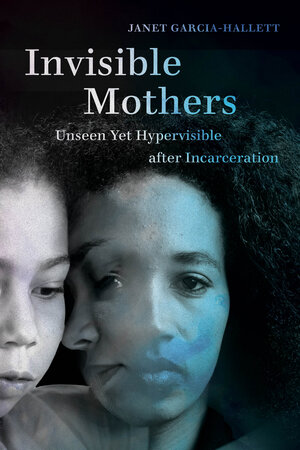Janet Garcia-Hallett, an Afro-Latina mother, first-gen scholar, and a product of Harlem, is Assistant Professor of Criminal Justice at the University of New Haven’s Henry C. Lee College of Criminal Justice and Forensic Sciences. For the annual American Criminology Society conference, she discusses her new book Invisible Mothers.

In the book, Garcia-Hallett shares the traditionally silenced voices of formerly incarcerated mothers of color and exposes the difficult realities they face when reentering the community and navigating motherhood. Patriarchy, misogyny, and systemic racism marginalize and criminalize these mothers, pushing them into the grasp of penal control and forcing them to live in a state of disempowerment and hypersurveillance after imprisonment. This thoughtful book reveals and contests their marginalization and highlights how mothers of color perform motherwork on their own terms.
What motivated you to write Invisible Mothers?
I was tired of discussions ignoring or disregarding the experiences of mothers of color in the criminal legal system. Discussions about mass incarceration typically focus on men. If they do actually consider women, it is often from a negative viewpoint that centers their crime and the negative consequences for their children. In this book, I center their voices as mothers and show how they navigated motherhood.
What was something unexpected or surprising that you learned in the course of interviewing formerly incarcerated mothers of color?
The public has a lot of expectations of what mothers should do and what mothering entails. These expectations are often why people judge formerly incarcerated mothers of color before giving them the chance to share their stories. When you have expectations about people and their experiences before speaking with them, then these expectations shape what you learn or take away from your conversations. So, I tried to go into interviews without any expectations, one way or another.
I will say that while I was interviewing mothers of color about life after incarceration, one thing that was surprising to me was how much I resonated with them. What people don’t realize is that anyone can end up in their shoes.
How do these mothers perform “motherwork” on their own terms? How are their experiences unique?
Mothering is work. Yet, as I mention in my book, not all motherwork is equally visible, validated, or respected by the general public. This is especially true for mothers in the criminal legal system. Their experiences are unique because of the competing demands they face in oppressive carceral systems. Still, they did motherwork through varying housing arrangements, in noncustodial circumstances, while recovering from substance use, with low pay, during unemployment, and while not in contact with their children. All things considered, they did motherwork that was realistic for them and their circumstances post-incarceration – even if this went unnoticed or was undervalued by outsiders.
You write that women of color with children are largely invisible in practical efforts to support formerly incarcerated people. What does your research suggest could be done to better support them?
Very briefly, I’ll share that it’s imperative they are heard, understood, and provided support through validation and empowerment, using anti-oppressive efforts to address the barriers stacked against them. I also argue that it is not enough to simply help these mothers deal with oppression without trying to dismantle the systemic oppression itself. For a detailed explanation of what could be done, I encourage people to read Invisible Mothers.
What is the main message you want readers to take away from your book?
I encourage readers to reflect on the mothers’ experiences shared within the book and to incorporate this knowledge into anti-oppressive efforts. Listening to and understanding formerly incarcerated women as visible mothers is more constructive in helping them and addressing systemic oppression than the carceral focus on managing, controlling, and punishing so-called “bad behaviors.”
As a Black feminist criminologist and a first-gen scholar, what advice would you give other first-gen scholars hoping to publish a book?
Go with your gut. When looking into potential publishers to submit your book proposal, pay attention to how you were made to feel during your conversations and go with your gut. Before I decided to go with the University of California Press, I was in communication with other university presses but quickly realized: it is crucial to land with a publisher where I felt supported and valued as a junior scholar of color. This was especially true as someone who was entering the book-writing journey for the first time. I went with my gut and that has turned out to be the best decision for me mentally and professionally.
Ask a lot of questions. Don’t be reluctant, shy, or embarrassed to ask questions. Asking questions is a part of the learning process, especially when it concerns writing and publishing a book that is so meaningful to you. When I was starting this process, I was completely clueless about the time commitment, what a book proposal entailed, where to send my proposal, how to respond to and integrate reviewers’ suggestions, and so much more! Book publishing was such a foreign task. Heck, I am still learning about this process! So, ask questions and be honest with yourself and others if anything is unclear.
Expect setbacks and give yourself grace. This sounds cliché, but another piece of advice is to expect the unexpected. It’s best to go into this process with the understanding that there will be setbacks in your writing journey and things will pop up that may stall your progress. I understand firsthand that things may feel overwhelming when trying to overcome setbacks. For this very reason, it is important to give yourself some grace as you navigate the unexpected – like a pandemic (who would’ve expected THAT?!).
Believe in yourself. As a first-gen scholar, I’ve always had some self-doubt about whether I could overcome barriers and accomplish certain things. I know this is a function of not having family members who have been through this academic journey before me and also feeling nervous about the unknown. The thought of writing a book seemed so unattainable to me and once I actually started, I began to wonder if it would ever be “finished” as a published book. However, too much self-doubt can be a hindrance. When you remain positive and believe in yourself, this can lead you to continue pushing yourself instead of throwing in the towel.
Get another set of eyes on your work. Think about your friends, colleagues, or even a Developmental Editor who can look over your writing or at least serve as a sounding board while you think through your work.
Lastly, embrace the support when your book comes out!
